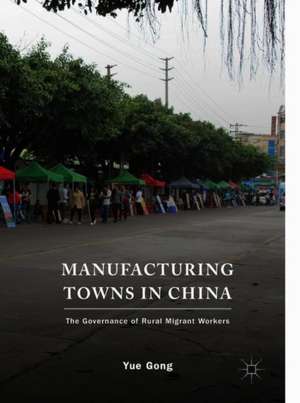Manufacturing Towns in China: The Governance of Rural Migrant Workers
Autor Yue Gongen Limba Engleză Hardback – 17 ian 2019
Preț: 643.99 lei
Preț vechi: 757.63 lei
-15% Nou
Puncte Express: 966
Preț estimativ în valută:
123.22€ • 129.00$ • 101.96£
123.22€ • 129.00$ • 101.96£
Carte tipărită la comandă
Livrare economică 05-19 aprilie
Preluare comenzi: 021 569.72.76
Specificații
ISBN-13: 9789811333712
ISBN-10: 9811333718
Pagini: 256
Ilustrații: XIX, 284 p. 17 illus., 11 illus. in color.
Dimensiuni: 148 x 210 mm
Greutate: 0.52 kg
Ediția:1st ed. 2019
Editura: Springer Nature Singapore
Colecția Palgrave Macmillan
Locul publicării:Singapore, Singapore
ISBN-10: 9811333718
Pagini: 256
Ilustrații: XIX, 284 p. 17 illus., 11 illus. in color.
Dimensiuni: 148 x 210 mm
Greutate: 0.52 kg
Ediția:1st ed. 2019
Editura: Springer Nature Singapore
Colecția Palgrave Macmillan
Locul publicării:Singapore, Singapore
Cuprins
Acknowledgments.- List of Abbreviations.- List of Chinese Terms.- List of Figures and Tables.- 1. Introduction: Governance, Rural Migrants, and Manufacturing Towns.- 2. Development of Manufacturing Towns in the 1980s and 1990s.- 3. Filtering Rural Migrants as Cheap Labor: Three Authorities’ Governance.- 4. Retail Streets: Recruiting Low-Skilled Migrants in Villages.- 5. Rental Housing: Surveillance of Rural Migrants.- 6. Central Squares: Guiding Rural Migrants in Planned Public Space.- 7. An Eco-High-Tech Town: Governing Rural Migrants to Become Skilled Workers.- 8. Resisting Governance: Production of Rural Migrants’ Selves.- 9. Conclusion: Governance and Manufacturing Towns in Continuous Reforms.- Appendices.- References.
Recenzii
“It will be best appreciated by readers with a solid background on China who will better understand the nuance and terminology used throughout the book (for instance Marxist references to mass-line work). … this book offers a new perspective on power relations between migrants and their governing authorities, with emphasis on the latter.” (Denise Hare, China Information, Vol. 34 (1), 2020)
“The book Manufacturing Towns in China weaves together various actors, policies and regulations, governance technologies, adaptations and resistances and develops an insightful and well-elaborated argument on the ‘invisible filter’ of the territorial governance in China. … Readers are guided through a journey of different events in the past as well as in the present, in the West as well as in the East and amongsocialists as well as capitalists.” (June Wang, Eurasian Geography and Economics, July 16, 2019)
Notă biografică
Yue Ray Gong is Assistant Professor at the School of Urban Planning and Design at Peking University Shenzhen Graduate School. His research focuses on urban governance and migration, housing and community, and periurban areas of China.
Textul de pe ultima copertă
This book offers an engaging and unique view of the governance of Chinese rural migrants in non-factory areas of manufacturing towns. By asking how authorities govern migrants as an ongoing source of cheap labor, this book demonstrates and interprets authorities’ power exercised in the form of governing rationalities, regulations, programs, activities, and designated non-factory spaces—town and village centers and migrant living zones. These power exercises take place routinely in migrants’ everyday lives but typically veil themselves, producing knowledge that legitimates our understanding of migrants. Based on their power exercises, authorities’ governance of migrants, like multiple “invisible filters” that select and help create migrant labor in non-factory areas, leads to an inclusion of a certain number of migrants as cheap factory workers and an exclusion of the rest. Nevertheless, by exercising their unique power techniques, migrants can resist and alter authority governance; thus the authorities’ power exercises are deficient and may ultimately be futile. This book details these power exercises, offers rewarding insights, and can greatly enrich our understanding of China’s local governance of migrants and migrant resistance.
Caracteristici
Offers a rich empirical study of the political rationales, interactions, strategies, and tactics of authorities in recruiting migrant workers from non-factory areas as cheap labour Highlights public space as a governing tool and shows how authorities shape space to facilitate governance Provides an original descriptive theoretical model of the governance of rural migrants in China
